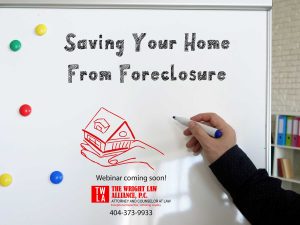Realizing you are facing foreclosure can leave you paralyzed with fear. Where will you move to? How will you ever recover from this? It can be one of the scariest things you face as a homeowner. In fact, just the possibility of it might already have you looking for a way to save your home before you’re actually facing it. This is where bankruptcy comes in. Chapter 7 is designed to provide people with a way to get out from under their debt. But chapter 13 is designed to provide a pathway for you to keep your property by offering you a repayment plan.
It is important to understand that bankruptcy isn’t a quick fix. It is a legal process, requirements must be met, and there are post-bankruptcy consequences.
What is Foreclosure?
Foreclosure happens when a homeowner falls behind on their mortgage payments. Ultimately – after following the legal process – the lender is then able to sell the home at auction. Thankfully, this isn’t a process that happens overnight. It typically begins after several payments are missed. But in the midst of the COVID-19 pandemic, many people are finding themselves unable to make their payments – putting them in this situation.
How Can Bankruptcy Help Me?
 Most people’s desire is to stay in their homes for the foreseeable or even indefinite future. And with many people working from home during the COVID-19 pandemic, maintain your current residence is likely even more important. Filing Chapter 13 bankruptcy will allow you to propose a repayment plan – typically lasting for five years. Over the length of this plan, you will be able to pay off your late unpaid payments. And assuming you make all required payments, you will be able to avoid foreclosure on your home.
Most people’s desire is to stay in their homes for the foreseeable or even indefinite future. And with many people working from home during the COVID-19 pandemic, maintain your current residence is likely even more important. Filing Chapter 13 bankruptcy will allow you to propose a repayment plan – typically lasting for five years. Over the length of this plan, you will be able to pay off your late unpaid payments. And assuming you make all required payments, you will be able to avoid foreclosure on your home.
Did you know that chapter 13 bankruptcy can even help with 2nd and 3rd mortgage payments? Of course, this is a bit more complicated, but it is possible based on certain circumstances.
Is Bankruptcy Right for Me?
The process of deciding if bankruptcy is right for you and which chapter you qualify for can be tricky. For example, with chapter 13 specifically, you will need to meet certain income requirements. As a bankruptcy attorney, we offer support in this area – giving you an ally from the very beginning.
As one of the highest ticket items in most people’s budget, it can be easy to fall behind on a mortgage payment. In some cases, a lender or mortgage company might be willing to work with you on a deal. This may include a short sale or loan modification. But unfortunately, more often than not, this isn’t the case. In most cases, the lender or mortgage company will begin the foreclosure process as laid out in the mortgage contract. This process involves the creditor repossessing the home and selling it.
Are you someone who has found yourself in this situation and now you’re hastily trying to figure out what to do?
Filing a chapter 7 or chapter 13 bankruptcy might be your relief you’re looking for.
When you took out a mortgage to buy your home, you assumed the responsibility of repaying that debt. And if you are unable to make your mortgage payment, you are not following through on that obligation. However, filing bankruptcy could offer you the opportunity you need to catch up. Look at it as temporary relief, because it will still take time and work.
What happens to my property after I file for bankruptcy?
Upon filing for bankruptcy, the court automatically issues an Order for Relief. An Order for Relief grants what it called an “automatic stay.” An automatic stay requires your creditors to stop collection attempts. Period. Therefore, if foreclosure is ordered on your home, it will be postponed, by law. It is postponed until the bankruptcy filing is finalized, which generally takes three to four months.
What happens beyond this will depend on the chapter of bankruptcy you file. Filing for chapter 13 will allow you to set up a repayment plan to pay off the past due payments. To continue to avoid foreclosure, you will need to continue to make all required payments for the length of the repayment plan. If you file for chapter 7, all the debt secured by the home, including mortgages and home equity loans are forgiven. However, the relationship between chapter 7 bankruptcy and foreclosure is complex and comes with cautionary notes.
We recommend speaking with an experienced Atlanta bankruptcy attorney to learn more about both options and how they would impact your scenario.
Finding the right bankruptcy attorney near me.

The first step to finding debt relief through filing bankrupt is finding the right Atlanta bankruptcy lawyer to handle your case.
At The Wright Law Alliance, we are committed to providing each client with exceptional service, compassion, and respect.
We are here to help you.
I am affected by COVID 19, what options are there for me?
 were as crippling to Georgians as the virus itself.
were as crippling to Georgians as the virus itself.Option A
Cut down on your expenses
Prioritize your debts
 Negotiate with creditors
Negotiate with creditors
Option B: Chapter 7 Bankruptcy
Option C: Chapter 13 Bankruptcy
 your property.
your property.While you might not be financially impacted to the degree that others are, your community might still be taking a hit. And for some, the financial burden might not be as obvious to you.
But as an experienced bankruptcy law firm we have seen just how hard this pandemic has hit some families’ budgets. Below are several visible issues affecting our local community.
Lost or Reduced Wages
Unemployment is a reason your neighbor might be threatened by foreclosure. When the pandemic happened businesses contracted and employees felt the brunt of the effects. Some people have saved up for rainy days but many haven’t but we’re about providing solutions to your problems. Some Georgia residents have lost their job entirely, while others just experienced a decrease in hours or pay. Either way, both scenarios include a financial impact of some sort.
Food Costs are Increasing
With more money in the local economy inflation naturally will cause prices to increase for Georgians. How does one adjust for this? If you’re eating out it is advisable learn to cook more and fire up the stove more often.
It is a supply and demand situation. This is a result of the pandemic that is affecting everyone – even if it doesn’t hurt your budget, you aren’t exempt from this impact.
Back to school, uptick in cases, back to home
Initially, for kids, the pandemic almost seemed like an extended summer vacation. Exciting, right?
But for parents – most of whom are working from home now – it just sounds like “cha-ching, cha-ching, cha-ching” as they spend more on streaming services and at-home activities to keep everyone occupied.
Now that cases are increasing there is pressure on what to do next. Looking back at the pandemic in the 1800’s we know wearing masks was a notable factor in reducing the Spanish flu and it only makes sense to be considerate to fellow Americans and wear a mask as a way of saying we want COVID-19 gone.
A Way to Manage Your Debt During COVID-19
Whether you have found yourself unemployed or just on an even tighter budget than when the pandemic started, the stress might be building. If you have found yourself in a situation that seems hopeless, it is time to explore your options.
Bankruptcy, while it may sound scary, can be the solution to help you save your house or walk away gracefully. Our goal is to help you overcome the financial strain put on you and your family by this pandemic. By wiping away debt the Wright Law Alliance wants to help you get back on track in a manageable way.
Working with a bankruptcy attorney near me
Finding a reputable bankruptcy attorney in your area is important to your case. And finding one with a comprehensive knowledge of georgia bankruptcy laws is the best way to avoid costly mistakes.
With over 20 years of experience in bankruptcy law, our team has the Atlanta bankruptcy attorney for you.
Schedule your complimentary consultation with us today: 404-373-9933 or book it online.
Schedule a complimentary 30-minute consultation with us today to learn more.
Whether you are facing foreclosure, are scared you might face foreclosure or just want to learn more about bankruptcy options, we’d love to speak with you.


Leave A Comment